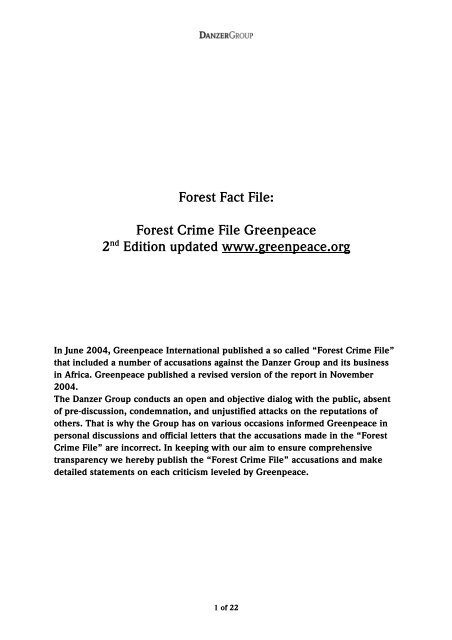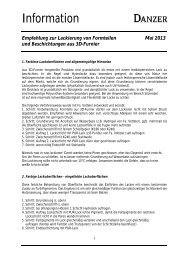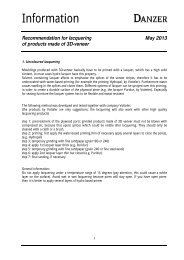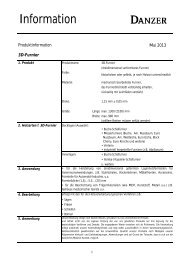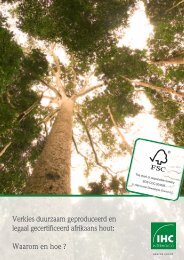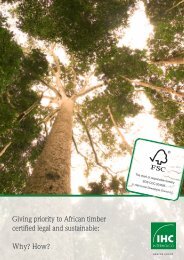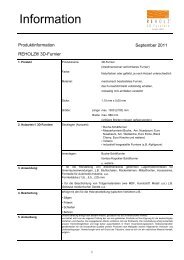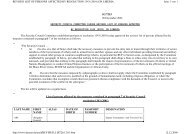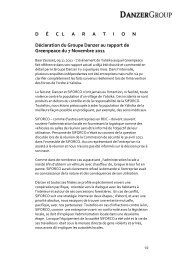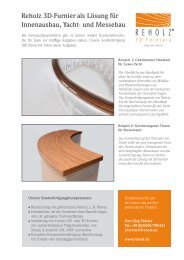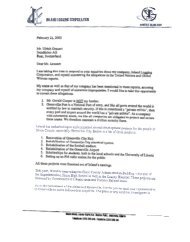Forest Fact File: Forest Crime File Greenpeace 2nd Edition ... - Danzer
Forest Fact File: Forest Crime File Greenpeace 2nd Edition ... - Danzer
Forest Fact File: Forest Crime File Greenpeace 2nd Edition ... - Danzer
You also want an ePaper? Increase the reach of your titles
YUMPU automatically turns print PDFs into web optimized ePapers that Google loves.
<strong>Forest</strong> <strong>Fact</strong> <strong>File</strong>:<br />
<strong>Forest</strong> <strong>Crime</strong> <strong>File</strong> <strong>Greenpeace</strong><br />
2 nd <strong>Edition</strong> updated www.greenpeace.org<br />
In June 2004, <strong>Greenpeace</strong> International published a so called “<strong>Forest</strong> <strong>Crime</strong> <strong>File</strong>”<br />
that included a number of accusations against the <strong>Danzer</strong> Group and its business<br />
in Africa. <strong>Greenpeace</strong> published a revised version of the report in November<br />
2004.<br />
The <strong>Danzer</strong> Group conducts an open and objective dialog with the public, absent<br />
of pre-discussion, condemnation, and unjustified attacks on the reputations of<br />
others. That is why the Group has on various occasions informed <strong>Greenpeace</strong> in<br />
personal discussions and official letters that the accusations made in the “<strong>Forest</strong><br />
<strong>Crime</strong> <strong>File</strong>” are incorrect. In keeping with our aim to ensure comprehensive<br />
transparency we hereby publish the “<strong>Forest</strong> <strong>Crime</strong> <strong>File</strong>” accusations and make<br />
detailed statements on each criticism leveled by <strong>Greenpeace</strong>.<br />
1 of 22
“By the mid-1980s, the environmental movement had abandoned science and logic in favor of<br />
emotion and sensationalism. I became aware of the emerging concept of sustainable development:<br />
balancing environmental, social and economic priorities. Converted to the idea that win-win<br />
solutions could be found by bringing all interests together, I made the move from confrontation to<br />
consensus.” (Patrick Moore, <strong>Greenpeace</strong> co-founder and 15-year full-time environmental activist.) 1<br />
1 “<strong>Danzer</strong> Group<br />
involved in bribery…”<br />
The <strong>Danzer</strong> Group is not corrupt and has never been involved in<br />
bribery. Our actions are guided by effective laws and conventions of<br />
international organizations like the OECD.<br />
Based on documents that were stolen from our offices in Baar,<br />
<strong>Greenpeace</strong> put together an unfounded charge against the <strong>Danzer</strong><br />
Group. The Swiss Attorney General started a preliminary<br />
investigation, which was discontinued within six months after finding<br />
no evidence to support the <strong>Greenpeace</strong> charge. <strong>Greenpeace</strong> still<br />
claims that the <strong>Danzer</strong> Group is involved in bribery, despite the fact<br />
that the company was audited (by the Attorney General) regarding its<br />
compliance with Swiss laws implementing the OECD standards<br />
against bribery. 2<br />
2 illegal logging, The <strong>Danzer</strong> Group does not practice illegal logging in its own<br />
concessions nor does it tolerate illegal logging by third party<br />
suppliers. To ensure that any timber traded within the Group stems<br />
from legally managed forest concessions, <strong>Danzer</strong> Group has<br />
introduced guidelines for the procurement of African round timber,<br />
sawn timber and veneers. The procurement rules are part of our<br />
environmental and safety management system (ESMS) which follows<br />
the international standard ISO 14001:2004. 3 The ESMS will be<br />
audited and validated by a third party.<br />
IFO, the <strong>Danzer</strong> Group company in the Republic of Congo<br />
(Brazzaville), is participating in the development of a legality audit<br />
1 Miami Herald. Posted on Sun, Jan. 30, 2005, ‘Environmental movement has lost its way’.<br />
2<br />
The OECD’s Anti-Bribery Convention was signed on 17 December 1997 and entered into force<br />
on 15 February 1999. The Swiss law implementing the OECD Convention entered into force on<br />
1 May 2000. The OECD “complimented the Swiss authorities for taking important steps towards<br />
the thorough implementation of the Convention into Swiss legislation”; see: OECD Country<br />
Report on the Implementation of the Convention on Combating Bribery, February 2000. In the<br />
Report on Phase 2, published in February 2005, among others, the OECD “applauds the efforts<br />
made by the Swiss authorities to make the criminal prosecution … more efficient”.<br />
3<br />
See www.danzer.com. ISO Standard 14001 is a management system to firmly establish<br />
systematic, all-embracing environmental protection for the purpose of continually and verifiably<br />
improving aspects related to the environment. Adherence to this standard is reviewed at regular<br />
intervals in audits performed by independent certification agencies. <strong>Danzer</strong> Group’s ESMS<br />
covers all relevant areas, from the procurement of raw materials, to production, through to the<br />
shipment of finished products, and contains binding provisions for all companies, including<br />
wide-ranging reporting and monitoring obligations.<br />
2 of 22
3 dealings with<br />
blacklisted arms<br />
trafficker<br />
4 and suspected of<br />
forgery”<br />
program called FORCOMS (<strong>Forest</strong> Concession Monitoring System for<br />
Central Africa) 4 and will undergo third party audits to confirm<br />
FORCOMS compliance as soon as FORCOMS is available. Thereafter,<br />
SIFORCO, the <strong>Danzer</strong> Group company in the Democratic Republic of<br />
Congo (Kinshasa), and third party suppliers will also be audited<br />
according to FORCOMS. 5<br />
Eliminating illegal logging is a principal concern for us – if only to<br />
protect our own investments in Africa. The <strong>Danzer</strong> Group owns forest<br />
concessions totaling 3 million ha in Africa. The availability of illegal<br />
timber drives prices down, because the timber is produced according<br />
to lower forestry standards. 6 Consequently, selling wood from<br />
sustainable forestry often does not allow one to cover costs. Therefore<br />
it is in our interest to establish fair and legal trading conditions for<br />
everyone.<br />
Further, the eradication of illegally produced timber is a precondition<br />
for an enduring creation of value and long-term development<br />
potentials in Africa. Sustainable use and industrial processing of<br />
timber constitute one of the few potentials for economic development<br />
in many countries of West and Central Africa.<br />
The Group’s business dealings are grounded in high ethical and legal<br />
standards. These standards are also required of third party suppliers<br />
and <strong>Danzer</strong>’s business partners.<br />
In the case of Gus Kouwenhoven’s ties to Afribois 7 we made mistakes<br />
of judgment and have to concede a lack of systematic due diligence.<br />
To ensure that bad actors are filtered out of our supply chain in the<br />
future, we are in the process of reviewing and re-enforcing our<br />
internal procedures, which includes reviews concerning political as<br />
well as criminal involvements.<br />
These procedures provide for a detailed check of the supplier’s legal<br />
status, including any international blacklists. In case that such a check<br />
results in any negative facts or evidence, no business relation will be<br />
started.<br />
As the charge of forgery is currently being investigated by the canton<br />
of Zug (Switzerland), we are not in a position to comment on this<br />
allegation. We want the legal proceedings to take their course without<br />
prejudice of either party. Once a result of the investigation is<br />
4 FORCOMS was developed by IUCN (Union Internationale pour la Conservation de la Nature)-<br />
CEFDHAC (Conférence sur les Ecosystèmes des Forêts Denses et Humides d’Afrique Centrale),<br />
IFIA (Interafrican <strong>Forest</strong> Industries Association), and WRI (World Resources Institute). The aim<br />
of this process is to monitor the legality and sustainability of forestry concessions in Africa based<br />
on specific criteria and indicators.<br />
5 http://www.globalforestwatch.org/english/index.htm<br />
6 FAO (Food and Agriculture Organization of the United Nations), STATE OF THE WORLD’S FORESTS<br />
2005 (hereinafter “SOFO”) at 76 (www.fao.org/forestry/site/21407/en).<br />
7 Details see section 52.<br />
3 of 22
5 “Western lowland<br />
gorillas occur in<br />
<strong>Danzer</strong>’s IFO<br />
concession in Congo-<br />
Brazzaville. Industrial<br />
logging increases the<br />
illegal bush meat trade<br />
which is driving the<br />
great apes such as the<br />
gorilla towards<br />
extinction.”<br />
6 “The documents<br />
submitted support the<br />
suspicion that<br />
employees of a <strong>Danzer</strong><br />
Group company were<br />
involved in the forgery<br />
of official government<br />
certificates.”<br />
7 “<strong>Danzer</strong> Group has so<br />
far refused to provide<br />
GP with a copy of the<br />
Attorney General’s<br />
decision.”<br />
8 “<strong>Danzer</strong> Group has<br />
not given a satisfactory<br />
explanation of the<br />
evidence put forward<br />
by GP in its reports.”<br />
available, we will take appropriate action.<br />
In the meantime, in spring 2005 a third party auditor (Société<br />
Générale de Surveillance – SGS) audited the handling of documents<br />
regarding shipments originating from Africa in the period from<br />
January 2003 to December 2004. The auditor did not find any forged<br />
documents.<br />
Indeed, there are lowland gorillas in our concessions in the Republic<br />
of Congo. Their population is estimated to be 36,000 on the 1.3<br />
million ha concession. 8<br />
In order to prevent poaching, we are in the process of implementing<br />
an anti-poaching program together with the Wildlife Conservation<br />
Society and the <strong>Forest</strong>ry Ministry of the Republic of Congo.<br />
As part of the project, the IFO concession is controlled by<br />
ECOGUARDS to prevent poaching. Among a comprehensive list of<br />
measures an internal company rule spells out anti-poaching measures,<br />
trucks are monitored to prevent the transport of bush meat, forest<br />
roads are permanently closed after forestry activities in the area have<br />
been stopped, and special hunting zones for traditional hunting rights<br />
are established with the local population. Poachers are arrested and<br />
prosecuted.<br />
See section 4.<br />
8 Etude écologique de l’UFA Ngombe<br />
In order to protect the privacy of individuals, we cannot publish the<br />
Attorney General’s decision; names of employees, suppliers and other<br />
individuals are stated in the decision.<br />
The findings of the Swiss Attorney General coincide with the results<br />
of our own investigation and confirm that <strong>Danzer</strong> AG and Interholco<br />
employees have not been involved in bribery. Furthermore they also<br />
did not find any evidence that other Group employees have been<br />
involved in such action.<br />
The <strong>Danzer</strong> Group was very careful to accurately respond to<br />
<strong>Greenpeace</strong>’s charges. We responded to each charge, but only once.<br />
The fact that <strong>Greenpeace</strong> repeated the same accusation worded<br />
slightly differently several times only gave the impression of separate<br />
charges.<br />
The purpose of this report is to leave no misunderstandings.<br />
4 of 22
9 “… activities as<br />
described in the travel<br />
report (Giger) …<br />
remain unexplained.”<br />
10 “<strong>Danzer</strong> started to<br />
build an industrial<br />
veneer empire … in<br />
1947”<br />
11 “… one of the biggest<br />
international traders in<br />
tropical round wood,<br />
sliced wood and<br />
veneers.”<br />
The travel report which was stolen from our offices is an internal<br />
report which, in any case, is not understandable for outsiders.<br />
In most cases, the “travel report” is quoted out of context. We<br />
routinely audit internal activities and review compliance with<br />
national, international and Group standards wherever we do business.<br />
Mr. Giger’s trip in April 2003 was one of these routine visits and his<br />
report must be viewed in this light.<br />
In the report (total of 9 pages) many subjects were covered, most of<br />
them in connection with accounting, controlling and compliance. This<br />
report is full of abbreviations and acronyms which make it difficult to<br />
read and understand for someone who is not familiar with our<br />
reporting.<br />
The report had a distribution list of 15 people. If there were really<br />
sensitive and incriminating information, would it have been<br />
disseminated so freely?<br />
An outsider unfamiliar with the “lingo” of African countries (i.e. frais<br />
de mission, cahier de charge) might misunderstand the wording of the<br />
document and thus misconstrue the content.<br />
In the following, we will explain all accusations in connection with<br />
the report in detail.<br />
This statement implies that <strong>Danzer</strong> is a huge timber company, which<br />
is wrong. The global timber industry is a 354 billion US$ business. 9<br />
<strong>Danzer</strong> Group only has a global market share of 0.16%. There are<br />
many companies in the industry that are “giants” in terms of sales<br />
and assets, but <strong>Danzer</strong> Group is not one of them.<br />
<strong>Danzer</strong> Group is not the largest trader in tropical timber by far.<br />
<strong>Danzer</strong> Group’s market share concerning trade with tropical timber<br />
amounts to only 0.3% on a global scale – far from being one of the<br />
biggest traders of tropical timber in the world. <strong>Danzer</strong> does not have<br />
any assets in South East Asia, but only in Africa. South East Asia<br />
controls the largest share of tropical timber business. 10 On a global<br />
9<br />
FAO, SOFO 2005 at 71: “Globally, the gross value added by the sector in 2000 (…) is estimated<br />
at about US$ 354 billion, or about 1.2 percent of GDP.”<br />
10<br />
In 2001, more than 75% of the world’s total exports of tropical timber originated from the Asian-<br />
Pacific region. Only 16% came from Africa. Regarding tropical logs, Malaysia dominates the<br />
trade with 6.5 million m 3 exported in 2001, constituting 45% of ITTO producer member exports<br />
(see: UNECE (United Nations Economic Commission for Europe)/FAO (2002): “<strong>Forest</strong> products<br />
annual market review 2001-2002”, Chapter 13, p. 181, www.unece.org/trade/timber/docs/<br />
rev-02/chap-13.pdf.<br />
5 of 22
12 “‘There are huge rents<br />
to be earned from<br />
activities such as<br />
logging in tropical rain<br />
forests, where permits<br />
can be obtained<br />
corruptly or where<br />
inspectors can be<br />
bribed’. World Bank<br />
1997”<br />
scale, tropical log production amounts to 126 million m 3 , of which<br />
nearly 80 million stem from the Asian-Pacific region 11 , 33.4 million<br />
from Latin America and only 12.6 million from Africa. 12<br />
Africa is a niche business in the global tropical timber trade and<br />
comparatively small.<br />
<strong>Danzer</strong> Group (with its own operations as well as the trading<br />
activities) has a market share of only 2% of total industrial hardwood<br />
production in Africa. 13<br />
Trading in tropical round wood, lumber and veneer amounts to only a<br />
small proportion of the Group’s consolidated net sales: in 2004, it<br />
amounted to € 18 million, or 4% of the consolidated Group’s net sales<br />
(€ 426 million). The total volume of our African timber activities,<br />
including our own local production facilities (and including the<br />
trading business), amounted to € 48 million, or 11% of net sales.<br />
In an area the size of a soccer field, <strong>Danzer</strong> fells only one tree every<br />
30 years – by no means is this destruction of the forests!<br />
<strong>Danzer</strong>’s focus is by no means on tropical timber. Our focus is on<br />
timber from temperate regions. Our timber stems almost exclusively<br />
from sustainably managed forests in the US and in Western and<br />
Central Europe.<br />
For decades, the strategy of our company has been to provide users of<br />
wood worldwide with high quality, decorative veneer and lumber. By<br />
nature, raw material suited for decorative purposes is extremely<br />
scarce. We are not mass producers of timber, let alone a destroyer of<br />
forests.<br />
<strong>Greenpeace</strong> takes this sentence of the World Bank out of context,<br />
which clouds its real meaning. Reading the whole document of the<br />
World Bank carefully, shows the real message of the Bank: Firms,<br />
which use corruption or bribery to avoid compliance with<br />
environmental regulations to save money, harm the environment.<br />
<strong>Danzer</strong> does not belong to the group of firms that act in the manner<br />
criticized by the World Bank.<br />
First of all, <strong>Danzer</strong> does not tolerate any action in which business is<br />
11<br />
It is estimated that over half of the logging in Indonesia is illegal, see: The <strong>Forest</strong>s Dialogue<br />
(2005): “Business, Governments and conservationists hold unprecedented gathering to combat<br />
illegal logging”, http://research.yale.edu/gisf/tfd/logging.html. This means that Indonesia<br />
alone produces twice as much illegal timber as the total (legal and illegal) timber production in<br />
Africa.<br />
12<br />
UNECE/FAO (2002): “<strong>Forest</strong> products annual market review 2001-2002”, Chapter 13, p. 181,<br />
www.unece.org/trade/timber/docs/rev-02/chap-13.pdf.<br />
13<br />
Based on the round log production of SIFORCO, IFO, as well as the trading activities of<br />
Interholco. Traded lumber was calculated back to round log volumes.<br />
6 of 22
done by illicit means. Consequently, it does not use corruption and<br />
bribery to avoid compliance with environmental regulations. To<br />
ensure that all business transactions are free of corruption and<br />
bribery, <strong>Danzer</strong> has developed a code of conduct as part of its<br />
comprehensive compliance rules. The “Code of Conduct: Countering<br />
Bribery and Related Matters” was developed together with the<br />
Société Générale de Surveillance. It adheres closely to the OECD<br />
Convention on Combating Bribery of Foreign Public Officials in<br />
International Business Transactions, the Inter-American Convention<br />
Against Corruption adopted by the Organization of American States,<br />
and the African Union Convention on Preventing and Combating<br />
Corruption. Adherence to the anti-corruption guidelines in the <strong>Danzer</strong><br />
Group is monitored constantly by an internal control system and is<br />
examined by independent auditors.<br />
Secondly, <strong>Danzer</strong> does not only comply with the environmental<br />
regulations, such as those the World Bank requires, but is much more<br />
engaged in environmental protection; sustainable forest management<br />
is a key element of our business activities (see section 2).<br />
<strong>Greenpeace</strong> misunderstood the statement by the World Bank.<br />
Nevertheless, we would like to respond to <strong>Greenpeace</strong>’s<br />
understanding of the statement, even though it is not what the World<br />
Bank wanted to say.<br />
We do not earn “huge rents … from activities such as logging in<br />
tropical rain forests”. On the contrary: in the last six years <strong>Danzer</strong><br />
Group has lost more than € 20 million with its African timber<br />
activities.<br />
Despite the huge losses, we decided to remain in Africa, because we<br />
feel responsible for and committed to our timber concessions, our<br />
1,800 employees, their families, and the countries that we have<br />
invested in.<br />
<strong>Danzer</strong> Group has always followed the strategy of local conversion; to<br />
create jobs not where the cheapest labor is, but close to the resource.<br />
Therefore, we have invested large amounts in Africa – thereby<br />
creating significant local value-added content.<br />
The World Bank emphasizes the positive role of private enterprises<br />
investing in Africa and conducting forestry activities in a sustainable<br />
manner. These private sector investors are important for the<br />
economic and social development of Africa. 14<br />
<strong>Danzer</strong> Group is financially harmed by the availability of illegal timber<br />
on the markets. Illegal timber on the market drives prices down,<br />
because it can be produced more cheaply. 15 We have every incentive<br />
14 World Bank (2004): “The World Bank and the Sustainable Management of <strong>Forest</strong>s in the Democratic Republic of Congo<br />
(DRC)”, http://lnweb18.worldbank.org/ESSD/ardext.nsf/11ByDocName/WBandSustainableManagement<br />
<strong>Forest</strong>sinDRCPage2.<br />
15 FAO, SOFO 2005 at 76: “According to the World Bank, illegal logging results in a loss of US$ 5 billion annually and a<br />
further loss of US$ 10 billion to the economies of timber-producing countries…[t]he activity depresses prices.”<br />
7 of 22
13 ILC and MMG as<br />
“related companies.”<br />
14 “Interholco procures<br />
wood not only from<br />
the last rainforests<br />
being destroyed in<br />
West and Central<br />
Africa …”<br />
15 “… but in many cases<br />
from companies that<br />
have been<br />
documented to be<br />
involved in illegal<br />
logging or, until very<br />
recently, associated<br />
with arms trafficking<br />
activities.”<br />
to help make illegal timber disappear from the markets.<br />
<strong>Greenpeace</strong> claims that ILC and MMG are companies related to<br />
<strong>Danzer</strong> Group.<br />
The term “related company” is a technical accounting term: This<br />
would mean that <strong>Danzer</strong> Group had management rights and/or owns<br />
equity in the companies.<br />
<strong>Danzer</strong> Group does not own any equity in either company.<br />
<strong>Danzer</strong> Group has no management rights in either company – neither<br />
de-facto nor de jure.<br />
The problem of tropical deforestation is much more prevalent in West<br />
Africa than it is in Central Africa.<br />
The annual negative rate of forest area change is very high in West<br />
Africa (-1.5%), whereas in countries of Central Africa it is much<br />
lower: Especially the Congo has a very low annual rate of forest area<br />
change (maximum of -0.1% per year).<br />
There are large rainforests in Central African countries that represent<br />
the second largest area of rainforest in the world. <strong>Forest</strong>s in Central<br />
Africa represent more than 60% of the total African volume and 7% of<br />
the entire world volume. In contrast, forests of West Africa represent<br />
only 13% of the total forest cover on the continent and 2% of the<br />
world forest area. 16<br />
The high rates of deforestation in West Africa are mainly due to<br />
climate, large populations, agricultural clearing and long-term export<br />
of wood products. 17 For example, the official government policies of<br />
Côte d’Ivoire have been developed to encourage immigration from the<br />
north with the intent to convert timberland to agricultural use. Here,<br />
farmers have cleared vast sections of forest to plant coffee and cacao.<br />
Today, Côte d’Ivoire is the world’s leading producer of cacao and one<br />
of Africa’s top coffee producers. 18<br />
See sections 2 and 3.<br />
16<br />
FAO, FRA (Global <strong>Forest</strong> Resources Assessment) 2000: Chapter 14-15, http://www.fao.org/<br />
documents/ show_cdr.asp?url_file=/DOCREP/004/Y1997E/Y1997E00.HTM).<br />
17<br />
FAO, FRA 2000: Chapter 14–15.<br />
18<br />
Microsoft Encarta Online Encyclopedia (2005): “Côte d’Ivoire” (http://au.encarta.msn.com).<br />
8 of 22
16 “<strong>Danzer</strong> Group<br />
companies do not<br />
hesitate to bribe<br />
officials in Africa.”<br />
17 “Only one-third of the<br />
original forests in<br />
Africa still remain, and<br />
less than one-tenth are<br />
still big enough to<br />
permanently maintain<br />
the biodiversity of a<br />
large intact<br />
rainforest.”<br />
18 “Experts consider over<br />
three quarters of all<br />
remaining frontier<br />
forests in Africa are<br />
threatened, mostly by<br />
the timber industry.”<br />
19 FAO, FRA 2000, Chapter 46, 47.<br />
See sections 1 and 7.<br />
The statement is based on obsolete data. The problem of tropical<br />
deforestation exists – but when assessing it, it is advisable to use upto-date<br />
figures. <strong>Greenpeace</strong> inaccurately quotes a study by the World<br />
Resource Institute which dates back to 1997.<br />
Current figures are provided by the FAO, which used satellite imagery<br />
to generate data 19 . According to the pan-tropical remote sensing<br />
survey the rate of deforestation of world’s tropical forests was 7% less<br />
in the 1990s compared to the decade before. The deforestation rate<br />
was 0.52% per year for the pan-tropical zone and 0.34 for tropical<br />
forests in Africa for the time period 1990-2000. 20<br />
As a side note, the 1997 WRI report concluded: “In Central Africa …<br />
logging itself causes relatively little damage because only a few highvalue<br />
tree species are removed.” The report emphasizes that the<br />
population increase in eastern Zaire, in particular, is of special<br />
concern to demands on the forest.<br />
It is not correct that the timber industry is the main reason for<br />
tropical deforestation in Africa. There are various factors which lead<br />
to the destruction of rainforests. 21 As <strong>Greenpeace</strong> is not disclosing<br />
who the “experts” are, we cannot comment on any specific source.<br />
What are the scientific data used? Do they refer to Africa?<br />
In Sub-Saharan Africa deforestation is primarily caused by activities of<br />
the general population:<br />
Fuel wood-gathering is one of the major causes of deforestation in<br />
African countries. In Africa, an estimated 90% of the entire<br />
continent’s population uses fuel wood for cooking, and in Sub-<br />
Saharan Africa, firewood and brush supply approximately 52% of all<br />
energy sources. 22<br />
Furthermore, “deforestation is still largely the result of the conversion<br />
of forest to other uses such as agriculture pasture and<br />
infrastructure.” 23 Especially land clearing by farmers is a major reason<br />
for the depletion of tree stocks. According to the Massachusetts<br />
20<br />
The survey was the first to provide a consistent methodology for assessing forest cover change<br />
between two assessment periods (1980 to 1990 and 1990 to 2000).<br />
21<br />
Agyei, Yvonne (Massachusetts Institute of Technology; African Technology Forum):<br />
“Deforestation in Sub-Saharan Africa” (http://web.mit.edu/africantech/www/articles/<br />
Deforestation.htm), see also: FAO, FRA 2000, March 2001.<br />
22<br />
See Agyei, Yvonne (2005).<br />
23<br />
Results of FRA 2000, March 2001 (FAO); see also: NASA Earth Observatory<br />
(http://earthobservatory.nasa.gov/Library/Deforestation/).<br />
9 of 22
Institute of Technology, conversion of forests for subsistence and<br />
commercial agriculture contributes as much as fuel wood-gathering to<br />
deforestation in Sub-Saharan Africa.<br />
Other reasons for deforestation in Africa are activities such as cattle<br />
ranching, cash crop plantations and the construction of dams, roads<br />
and mines.<br />
Poverty and high population growth contribute to the depletion of<br />
tree stocks.<br />
“The national demand for forest products within the countries where<br />
deforestation is occurring is a much more important cause of<br />
deforestation than the demand for these same products on the<br />
international markets. It should be noted that this conclusion is<br />
contrary to the opinion held by many Northern NGOs that it is the<br />
industrialized countries’ insatiable demand for tropical timber that is<br />
driving deforestation.” 24 80% of the wood used in developing<br />
countries is for firewood, and shifting cultivation accounts for two<br />
thirds of tropical deforestation .25<br />
In its concessions in Africa, <strong>Danzer</strong> Group only cuts one tenth of what<br />
is cut in forests in Germany. <strong>Danzer</strong> Group cuts on average 12m 3 per<br />
ha in a 30-year cycle. This equals 0.4 m 3 per ha per year. To<br />
compare: In Germany, the average annual cut is 4 m 3 per ha, or ten<br />
times higher. 26<br />
The Congo Basin is 60% swamp and under water. 27 These areas<br />
cannot be utilized for sustainable forestry or for agriculture. 28<br />
The causes of tropical deforestation in Africa are very different from<br />
those in South East Asia, or in South America. As other main<br />
stakeholders, such as local governments, the European Union, the<br />
World Bank, IUCN and WWF, <strong>Danzer</strong> Group believes that long-term,<br />
sustainable forest management is possible in Africa for generations to<br />
24<br />
CFAN (CIDA <strong>Forest</strong>ry Advisory Network), 1999, Deforestation: Tropical <strong>Forest</strong>s in Decline:<br />
http://www.rcfa-cfan.org/english/issues.12-5.html.<br />
25<br />
CFAN, see above.<br />
26<br />
There are FSC certified tropical forests in South America that on average cut down as much as<br />
3m/ha. We do not believe that this is sustainable.<br />
27<br />
The largest swamp tropical forest in the world (10 million ha) is still in the Congo Basin,<br />
(Mayauz, Philippe; Bartholomé, Etienne et al (2004): A new land-cover map of Africa for the<br />
year 2000, in: Journal of Biogeography 31, p. 867).<br />
28<br />
The decay processes in the tropical forests release as much carbon dixoxide as the living trees<br />
absorb. Thus, the tropical forest does not bind carbon dioxide. “Only a managed forest with a<br />
high amount of young trees binds carbon dioxide and thus contributes to climate protection”,<br />
(Holzabsatzfonds (2004): “Natürlich Holz. Die deutsche Forstwirtschaft. Zahlen und Fakten”).<br />
Latest research suggests that the Amazon is a net producer of carbon dixoxide, not an absorber:<br />
The Amazon is “… emitting much more (carbon dixoxide) than it is absorbing”, Philip Fearnside<br />
from the Brazil’s National Institute of Amazon Research on the Third Science Conference of the<br />
Large-scale Biosphere-Atmosphere Experiment in Amazonia, 27-29 July 2004, Brasil, Brasilia.<br />
10 of 22
19 “These forests have<br />
been at the epicenter<br />
of violent conflicts for<br />
the past decades in<br />
several African<br />
countries, from Sierra<br />
Leone to the<br />
Democratic Republic<br />
of Congo, from Liberia<br />
and the Ivory Coast to<br />
Central African<br />
Republic. Local<br />
populations have been<br />
held hostage, either to<br />
militias and armies, or<br />
to all-powerful<br />
industrial groups<br />
seeking profits at any<br />
cost.”<br />
20 “Destructive logging<br />
nonetheless continues<br />
largely unabated in<br />
Africa.”<br />
21 “The (OECD)<br />
Convention (on<br />
Combating Bribery …)<br />
makes it a crime to<br />
‘offer, promise or give<br />
a bribe to a foreign<br />
public official in order<br />
to obtain or retain<br />
international business<br />
come. This is why we have committed our resources to this continent.<br />
The local population in Africa has been held hostage mostly by civil<br />
war. 29 The problem is not “powerful industrial groups.” The main<br />
problem, from which the local population in Africa suffers, is civil<br />
war. Civil war in Africa is mainly due to deep-rooted ethnic and<br />
religious conflicts as well as population increase. The forest cannot be<br />
regarded as the epicenter of civil war.<br />
In the war in Congo, 3 million people died between 1998 and 2003. 30<br />
Today, there is civil war or at least a very unstable political situation<br />
in Liberia, Ivory Coast, Togo, Nigeria, Central African Republic,<br />
Democratic Republic of Congo, Rwanda, and Burundi.<br />
Personally knowing the fears of the local people through our<br />
operations in DRC during the last years of civil war, we can assure<br />
that timber companies have been a source of stability, income and<br />
medical services. By supporting the development of an efficient<br />
domestic timber industry and by providing jobs and education, <strong>Danzer</strong><br />
helps to combat local poverty and instability in Africa.<br />
The timber industry plays a vital role in the economic development of<br />
sub-Saharan countries. Based on the above-mentioned data it is<br />
obvious that logging cannot globally be called “destructive.”<br />
Today there is a major effort of many companies in Africa, including<br />
<strong>Danzer</strong> Group, to improve the paper flow and the documentation so<br />
that customers and the general public have guarantees that the timber<br />
they buy stems from legal and sustainable sources.<br />
Several organizations like Global <strong>Forest</strong> Watch, Interafrican <strong>Forest</strong>ry<br />
Association, and European timber trade associations are in the<br />
process of developing and implementing such procedures. The<br />
preparation of forest management plans is at different stages in<br />
Central African countries: in Cameroon 31% of concessionaires had<br />
approved management plans in May 2004, while in the Republic of<br />
Congo, IFO, a <strong>Danzer</strong> Group company, is among the first two<br />
companies finalizing their management plans. 31<br />
<strong>Greenpeace</strong> omits key components of the OECD Convention on<br />
Combating Bribery of Foreign Public Officials in International<br />
Business Transactions. Thus it distorts what the OECD says.<br />
Article 1 of the respective OECD Convention makes it a crime to<br />
“offer, promise or give any undue pecuniary or other advantage … to<br />
a foreign public official … in order that the official act or refrain from<br />
acting in relation to the performance of official duties, in order to<br />
29 FAO, SOFO 2005: “<strong>Forest</strong>s and war, forests and peace” at 116 – 123<br />
30<br />
The Economist, 17.01.2004, p. 1.<br />
31<br />
World Resources Institute (WRI); Global <strong>Forest</strong> Watch; Ministère de l’Environnement et des<br />
Forêts Cameroun (MINEF), 2004, Atlas forestier interactif du Cameroun.<br />
11 of 22
deals.’” obtain or retain business or other improper advantage in the conduct<br />
of international business.”<br />
22 “Instead of complying<br />
with national laws and<br />
the OECD Convention<br />
…<br />
23 … and setting<br />
standards for<br />
sustainable<br />
development …<br />
To get a full understanding of the OECD Convention, one should also<br />
take into account paragraph 9 of the Commentaries which says:<br />
“Small ‘facilitation’ payments do not constitute payments made ‘to<br />
obtain or retain business or other improper advantage’ within the<br />
meaning of paragraph 1 and, accordingly, are also not an offense.<br />
Such payments, which, in some countries, are made to induce public<br />
officials to perform their functions, such as issuing licenses or<br />
permits, are generally illegal in the foreign country concerned. Other<br />
countries can and should address this corrosive phenomenon by such<br />
means as support for programs of good governance. However,<br />
criminalization by other countries does not seem a practical or<br />
effective complementary action.” 32<br />
<strong>Danzer</strong> Group always complied with the OECD Convention (see<br />
below).<br />
The <strong>Danzer</strong> Group has always complied with the OECD Convention<br />
on Combating Bribery of Foreign Public Officials in International<br />
Business Transactions. No illegal payments were made to public office<br />
holders. This has been confirmed by the Swiss Federal Prosecutor’s<br />
Office.<br />
In our efforts to improve sustainable forest management in our<br />
African business we have actively cooperated with NGOs and experts.<br />
Since 1999, together with the World Bank, we have initiated a<br />
constructive dialog between industry and NGOs in the CEO<br />
WORKING GROUP ON AFRICAN FORESTS. As far as wildlife<br />
protection is concerned, <strong>Danzer</strong> provided an area of 60,000 ha in the<br />
Lomako area in RDC to WWF to create a Bonobo reserve as early as<br />
1983.<br />
Sustainability has been central to all our business activities for years.<br />
Environmental protection is the focal point of our sustainability<br />
management. In 1994, <strong>Danzer</strong> Group started to introduce an<br />
environmental and safety management system (ESMS) in accordance<br />
with the draft of international standard ISO 14001 that was finally<br />
published in 1996. External experts verify the observance of the<br />
comprehensive reporting and controlling obligations.<br />
The <strong>Danzer</strong> Group supports sustainable development in Africa. To<br />
ensure that any timber traded within the Group stems from legally<br />
and sustainably managed forest concessions, we introduced<br />
guidelines for the procurement of African round logs, sawn timber<br />
and veneers (see section 2). <strong>Danzer</strong> supports the development of an<br />
efficient domestic timber industry that provides jobs, training and<br />
education for local skilled workers.<br />
32<br />
Commentaries on the OECD Convention on Combating Bribery adopted by the Negotiating<br />
Conference on 21 November 1997.<br />
12 of 22
24 … <strong>Danzer</strong> Group<br />
continues to support a<br />
logging sector that is<br />
fuelling rampant<br />
corruption in the<br />
region.”<br />
25 “In a confidential<br />
report about <strong>Danzer</strong><br />
Group’s business<br />
activities in Africa …”<br />
26 Giger summarizes:<br />
“With regard to<br />
gifts / frais de mission<br />
(baksheesh), three<br />
philosophies occur to<br />
me in Africa. In<br />
Douala one is<br />
blackmailed into<br />
having to pay<br />
baksheesh amounting<br />
to hundreds of<br />
thousands of FF, and<br />
this is also paid out<br />
liberally. In Congo …,<br />
Mr. H … tries to be<br />
more restrained but<br />
nevertheless is<br />
prepared to pay where<br />
necessary. At IFO both<br />
Mr. S … and Mr. D …,<br />
are absolutely against<br />
such gifts and are also<br />
about to rigorously<br />
eliminate the old<br />
sinecures. Mr. S…’s<br />
philosophy is not to<br />
give any gifts in<br />
advance in order to<br />
avoid any possible<br />
difficulties. If there is<br />
any threat of a fine, socalled<br />
conditioned<br />
To make sure that all enterprises of the <strong>Danzer</strong> Group comply with<br />
high ethical and legal standards and to ensure transparency, we have<br />
introduced third party audits as a control and continual improvement<br />
mechanism.<br />
On the contrary, <strong>Danzer</strong> fights corruption. To ensure that all business<br />
transactions are free of corruption and bribery, <strong>Danzer</strong> has developed<br />
a code of conduct as part of its comprehensive compliance rules (see<br />
section 12). Furthermore, we have introduced procurement rules<br />
which ensure that any timber traded within the Group stems from<br />
legally and sustainable managed forest concessions (see section 2).<br />
Thus, <strong>Danzer</strong> prevents illegal logging – in its own concessions as well<br />
as in the concessions of third party suppliers.<br />
This report (see above) was an in-house report and was written for<br />
insiders that are familiar with the jargon of Africa.<br />
The report had a distribution list of 15 people<br />
Nowhere did the report say “confidential” or “classified”<br />
There is nothing in the report that would grant the status of<br />
“confidential” within the organization. This is an internal audit<br />
report that was not written in explicit language.<br />
<strong>Danzer</strong> Group does not claim that there is not a constant danger of<br />
corruption in these countries. That is why trips like Mr. Giger’s April<br />
2003 trip are vital to us.<br />
As mentioned above, there are clear guidelines provided by OECD<br />
that govern our standards.<br />
Mr. Giger’s April 2003 report clearly states that the <strong>Danzer</strong> Group’s<br />
policy of not engaging in dishonest transactions leaves the Group at a<br />
business disadvantage in that region.<br />
13 of 22
cases, he is, however<br />
prepared to take care<br />
of this by giving a<br />
gift.”<br />
27 “The scale of bribery<br />
practices by <strong>Danzer</strong><br />
Group’s employees in<br />
Africa is not fully<br />
known and requires<br />
further investigation.”<br />
28 “[T]here apparently<br />
have been ‘undeclared<br />
exports of IHC via<br />
Alima F.’”<br />
29 “Giger discusses a tax<br />
demand, including<br />
fines, for € 360 million<br />
against SIFORCO in<br />
DRC.”<br />
30 “To solve this problem<br />
Giger states ‘It is<br />
calculated that a<br />
maximum of US$<br />
50,000 will be needed<br />
to get this whole thing<br />
off the table.’”<br />
31 “Although today it<br />
(SIFORCO) is fully<br />
owned by the <strong>Danzer</strong><br />
Group, it is still<br />
financially supported<br />
by DEG.”<br />
32 “[<strong>Danzer</strong> Group] do<br />
not explain … how<br />
being ‘blackmailed [in<br />
the port of Douala]<br />
into having to pay<br />
baksheesh amounting<br />
to hundreds of<br />
thousands of FF’ is<br />
required by law.”<br />
The Attorney General’s investigation determined that there was no<br />
evidence of bribery practices by <strong>Danzer</strong> Group’s employees in Africa.<br />
However, to ensure that we have precise sets of standards and to<br />
facilitate future audits (or “further investigations”) of our activities,<br />
we have introduced a Code of Conduct (see section 12).<br />
<strong>Danzer</strong> Group has neither been investigated nor prosecuted in Africa<br />
for corruption by relevant officials. We have nothing to hide.<br />
An internal report like the travel report is an internal working paper.<br />
After this whole issue had been analyzed in all relevant details it is<br />
clear that all exports of Alima F. concerning timber purchased by<br />
Interholco have been properly declared.<br />
For a company that barely survived the civil war, that suffered huge<br />
losses and that had annual net sales well below € 10 million, a tax<br />
assessment of US$ 360 million is absurd in any country. If there were<br />
a legitimate claim of that magnitude<br />
SIFORCO would have to have a profit of roughly US$ 1 billion<br />
Annual sales of roughly US$ 75 billion<br />
As the tax bill was obviously absurd, Mr. Giger’s language is facetious:<br />
“to get this off the table” – well, what is there to get off the table? A<br />
clearly erroneous tax bill.<br />
In the end, Mr. Giger estimates that the legal fees and tax consultants’<br />
costs to clear up the misunderstanding would be US$ 50,000, which<br />
we actually paid to our lawyer.<br />
SIFORCO is fully owned by <strong>Danzer</strong> Group. DEG has no financial<br />
interests in the company.<br />
Mr. Giger first mentions the situation in Douala in general, before he<br />
goes on to mention more specifically how <strong>Danzer</strong> Group management<br />
handles the daily “blackmailing”.<br />
The <strong>Danzer</strong> Group has always complied with the OECD Convention<br />
on Convention on Combating Bribery of Foreign Public Officials in<br />
International Business Transactions. No illegal payments were made<br />
to public office holders. This has been confirmed by the Swiss Federal<br />
Prosecutor’s Office. It cannot be stressed enough that we are indeed<br />
at a competitive disadvantage in Africa as a result of our commitment<br />
to ethical conduct there.<br />
33 “<strong>Danzer</strong> Group has Our enquiries showed that not all public officials are eligible to be<br />
14 of 22
confirmed that to pay<br />
frais de mission only<br />
as required by law …<br />
represents a change of<br />
practice.”<br />
34 “Whilst the <strong>Danzer</strong><br />
Group does<br />
undoubtedly give<br />
money to charitable<br />
organizations, Giger’s<br />
travel report highlights<br />
that they also make<br />
payments for other<br />
purposes.”<br />
35 “IHC purchases logs<br />
and timber from the<br />
logging company Mba<br />
Mba Georges (MMG),<br />
with which it has a<br />
close financial<br />
partnership.”<br />
36 “Through loans to<br />
MMG, Interholco<br />
seems to have secured<br />
exclusive marketing<br />
rights for all MMG<br />
products.”<br />
37 “In 2000, MMG was<br />
involved in illegal<br />
logging on a massive<br />
scale.”<br />
paid frais de mission in the Republic of Congo. Some officials claimed<br />
that they were eligible for frais de mission payments even though – as<br />
we found out thanks to visits like Mr. Giger’s – in reality they were<br />
not.<br />
As <strong>Greenpeace</strong> states, we are engaged in many charity activities. 33<br />
Giger’s report states that the <strong>Danzer</strong> Group companies are willing to<br />
make gifts in the form of lumber (once in a while we provide heavy<br />
equipment for construction purposes for public roads etc. as well).<br />
<strong>Danzer</strong> Group encourages businesses that are owned and run by local<br />
Africans. The company MMG is owned by Mba Mba Georges. In<br />
1999, he offered a partnership, which we declined. Nevertheless, we<br />
helped MMG with financial advances and prepayments so that MMG<br />
could build a sawmill. This way MMG could start local transformation<br />
with the subsequent creation of up to 200 jobs. We believe that this<br />
concept is a good cooperation that can foster local entrepreneurship<br />
and help local economies. <strong>Danzer</strong> has no partnership or financial<br />
participation in this company.<br />
MMG has an approved <strong>Forest</strong> Management Plan (one of the first<br />
companies in Cameroon to do so). We are in the process of evaluating<br />
their plan.<br />
The UN organization FAO uses MMG as one example for a case study<br />
that demonstrates successful sustainable forest management in<br />
Africa. 34<br />
Indeed, <strong>Danzer</strong> Group gave loans to MMG. But this is not an exclusive<br />
arrangement. If MMG decides to sell all products to the <strong>Danzer</strong><br />
Group, this is primarily in order to reduce the indebtedness towards<br />
<strong>Danzer</strong>.<br />
There are reports published in 2001 and 2002 which indicate illegal<br />
logging 35 . At the time we were not aware that they might have been<br />
logging outside their concession. Reading the numbers mentioned in<br />
33 Please refer to the section CSR on the <strong>Danzer</strong> Group website<br />
34<br />
FAO <strong>Forest</strong>ry Department (2003): “Sustainable management of tropical forests in Central<br />
Africa”, http://www.fao.org/documents/show_cdr.asp?url_file=/docrep/006/y4853e/<br />
y4853e00.htm.<br />
35<br />
MINEF Joint Mission UCC (Central Control Unit) of a forester section and an independent<br />
observer, KRIBI 7-8 October 2000. UCC is a unit set up at the Ministry of Environment and<br />
<strong>Forest</strong>s of the Republic of Cameron (MINEF) to execute control missions with the independent<br />
observer Global Witness.<br />
15 of 22
38 “Grauert seems to<br />
have a poor memory<br />
as in April 2003 he<br />
was directly informed<br />
by Rene Giger about<br />
MMG’s ongoing illegal<br />
logging in the newly<br />
obtained concession<br />
UFA 00-003.”<br />
39 “Giger states: ‘Logging<br />
volumes are not being<br />
achieved. Yield is not<br />
being achieved<br />
because the diameters<br />
are too small. MMG is<br />
already felling illegally<br />
in the next coupe; as a<br />
result, next year the<br />
same coupe will be<br />
worthless again.”<br />
40 “Just as Giger’s<br />
remark indicates<br />
ongoing illegal logging<br />
activities by MMG<br />
beyond the 2000<br />
incident, the company<br />
also continues to<br />
evade its financial<br />
the report, it is not correct to speak of a “massive scale”, however.<br />
Today we systematically carry out controls in order to ensure that the<br />
timber traded by us is legal.<br />
The report by Auzel et al. (2002, page 30), states: “The investigations<br />
show the confusion in the attribution of forest permits, for which<br />
there are often different geographic locations.” The different locations<br />
of logging permits in Cameroon have often led to confusion in the<br />
past. Currently in Cameroon these practices have been changed by<br />
the installation of “Global <strong>Forest</strong> Watch” and “Global Witness –<br />
Resource Extraction Monitoring”, as independent observers. The two<br />
observers are monitoring the attribution of logging permits and<br />
helping to produce detailed maps that do not lead to any confusion.<br />
In the last years different field visits of Global Witness, WWF and<br />
others have been made and in general they show a positive picture of<br />
MMG. In recent years, on many occasions MMG has been invited as<br />
host for field visits and trainings of different organizations (FAO,<br />
OIBT, WWF-Cameroon, RIFFEAC). This would not have been the case<br />
if MMG had had a negative reputation in the past years.<br />
To claim that <strong>Danzer</strong> knowingly supported MMG in illegal logging or<br />
knowingly bought illegal timber is false.<br />
As far as Mr. Giger’s assessment of potential illegal logging is<br />
concerned, we investigated the case. There is a rather simple<br />
explanation for the matter. Mr. Giger was not informed about the<br />
attribution in July 2002 of the next annual allowable cut (AAC) for<br />
2003 at the end of the 2001-2002 logging year. This was conducted<br />
throughout the whole of Cameroon in order to harmonize the logging<br />
year (July to June) with the fiscal and the calendar year. Therefore, all<br />
concessionaires obtained their next AAC for 2003 in July 2002, valid<br />
until the end of 2002, and the 2004 AAC at the beginning of 2003.<br />
In addition, Mr. Giger refers to small diameters for a low yield in the<br />
sawmill, though he never mentions cutting below legal minimum<br />
harvesting diameters. In Cameroon, legal minimum harvesting<br />
diameters are relatively low (60 cm at breast height for Azobé for<br />
example). Currently, with the application of the management plan in<br />
2005, minimum harvesting diameters have been increased for most<br />
species.<br />
According to our investigations there is no indication of ongoing<br />
illegal logging activities by MMG.<br />
MMG might have financial obligations.<br />
Most companies have financial debts. Debt alone cannot be regarded<br />
as an indication of illegal logging, bad management or other<br />
questionable practices.<br />
16 of 22
obligations.”<br />
41 “MMG’s history of<br />
illegal logging means<br />
an independent<br />
investigation of their<br />
logging activities is<br />
long overdue.”<br />
42 “The UNSC was<br />
forced to take this<br />
drastic, unprecedented<br />
measure because<br />
international dealers<br />
such as Interholco had<br />
been unwilling to<br />
voluntarily stop<br />
trading with an<br />
industry that financed<br />
Liberian president and<br />
warlord Charles<br />
Taylor.”<br />
43 “These included<br />
Maurice Cooper, coowner<br />
of the Inland<br />
Logging Company<br />
(ILC).”<br />
44 “<strong>Danzer</strong> Group’s<br />
Interholco AG had a<br />
very close partnership<br />
with ILC. It was the<br />
company’s exclusive<br />
agent for the export of<br />
timber.”<br />
45 “The ILC also<br />
maintained a private<br />
militia in Sinoe County<br />
and managed the port<br />
of Greenville.”<br />
As a consequence of the implementation of our procurement rules<br />
(see section 2) in Africa, MMG will have to undergo a third party<br />
audit. Mba Mba George has already signaled his full support for the<br />
process.<br />
This statement implies that Interholco was one of the major reasons<br />
why the old regime stayed in power. The numbers do not support this<br />
allegation:<br />
Interholco bought timber from various sources in Liberia from<br />
1999 to 2003<br />
Based on official export statistics, Interholco bought the following<br />
shares of the Liberian timber production: 36<br />
In 2000, Interholco bought 2.8% of the timber production<br />
In 2001, Interholco bought 5.8% of the timber production<br />
In 2002, Interholco bought 6.1% of the timber production<br />
In 2003, Interholco bought 7.8% of the timber production<br />
It is dishonest to allege that the business of Interholco had any<br />
significant impact on the timber industry or the political situation in<br />
Liberia.<br />
It is not true that Maurice Cooper is co-owner of the Inland Logging<br />
Company (ILC). Maurice Cooper is the brother of Oscar Cooper.<br />
UNSC states that Oscar and Maurice “manage” the company.<br />
<strong>Greenpeace</strong> quotes the UNSC as claiming that they are “co-owners.”<br />
The UNSC never stated that.<br />
Oscar Cooper confirmed to us in a written statement (21 February<br />
2002), that his brother has no involvement whatsoever in ILC.<br />
ILC has never been an exclusive agent for the <strong>Danzer</strong> Group. <strong>Danzer</strong><br />
Group encourages local African entrepreneurs, but we have never had<br />
any “close partnership” nor did we use an exporter. We have never<br />
owned shares in ILC. We just made prepayments and financial<br />
advancements to ILC.<br />
Indeed, ILC sold most of its timber production to Interholco.<br />
In a continent with civil war it is necessary to provide for securityrelevant<br />
precautions. Being in charge of the port management of<br />
Greenville, ILC had to employ security guards.<br />
Employees of <strong>Danzer</strong> Group have never seen a militia or any kind of<br />
organized armed force.<br />
46 “The militia has been Evidence to confirm this allegation has not been revealed. Local<br />
36<br />
Source total timber production of Liberia: FAO statistics database; http://faostat.fao.org/faostat/<br />
collections?subset=forestry<br />
17 of 22
eported as harassing<br />
local people.”<br />
47 “The OTC’s manager,<br />
Dutchman Gus van<br />
Kouwenhoven, was<br />
regarded by the UNSC<br />
as a key figure in the<br />
logistics of illegal arms<br />
movements to<br />
Liberia.”<br />
48 “Trading in Liberian<br />
logs and with the OTC<br />
in particular did not,<br />
however, prevent the<br />
<strong>Danzer</strong> Group stating,<br />
in a letter (10 January<br />
2002) sent to a<br />
German citizen: “The<br />
<strong>Danzer</strong> Group and all<br />
its subsidiary<br />
companies will do<br />
absolutely no business<br />
with companies which<br />
trade arms … In our<br />
business-to-business<br />
relations we make<br />
decisions solely in<br />
accordance with our<br />
standards and in no<br />
event we do wish our<br />
business relationships<br />
to be misused for<br />
financing weapons or<br />
civil wars.”<br />
Yet, despite [<strong>Danzer</strong>’s]<br />
continual denials, new<br />
evidence has been<br />
people from Sinoe County have never told us about harassment by<br />
ILC. The UNSC accusations prompted an inquiry at ILC. In a letter to<br />
Interholco (21 February 2001), ILC invited everyone to inspect its<br />
“militia” or to talk to people in Greenville about so-called<br />
harassment. Oscar Cooper openly invited everybody to verify the<br />
falsity of the accusation. 37<br />
All our business actions are based on high ethical and legal standards<br />
and we expect our suppliers to maintain these standards. If this is not<br />
the case, we stop the respective business connection immediately. In<br />
the case of OTC we have to concede that our systematic due diligence<br />
failed. As soon as the business management of <strong>Danzer</strong> Group found<br />
out about the indiscretions, all business connections were stopped<br />
immediately. We have learned from this experience and developed a<br />
system, according to which we will act in the future. This system will<br />
also include procedures concerning political and criminal<br />
involvement, and ensures that something like this will not happen<br />
again.<br />
As mentioned above, our control and information chain, as well as<br />
our due diligence auditing, did not work reliably enough.<br />
Nevertheless, we want to avoid incorrect information. We will,<br />
therefore, describe the process with OTC during insecure political<br />
times:<br />
Up until 2003, Interholco had business dealings with various<br />
companies in Liberia, including OTC. When the UN export<br />
prohibition for Liberia took effect in July 2003, Interholco<br />
immediately broke off all business contacts with this country.<br />
Interholco stopped its supplies from OTC in September 2000. After a<br />
review of the situation with OTC, Interholco resumed its business<br />
relationship with OTC in September 2001.<br />
When Interholco was first made aware of the accusations by Global<br />
Witness 38 Interholco re-evaluated the business relationship with OTC.<br />
In January 2001, the decision was taken not to buy any further timber<br />
from OTC but only to honor the remainder of existing contracts. The<br />
last shipment pursuant to these contracts was made in February<br />
2002.<br />
Based on the very favorable report to the UNSC by Kofi Annan 39 about<br />
the social and economic contributions of the timber industry in<br />
Liberia, in which OTC was specifically mentioned as a positive<br />
contributor to the country, Interholco decided to reassess its position<br />
regarding OTC. Interholco and OTC resumed a regular business<br />
relationship in August 2002.<br />
37 21 February 2002 letter from Oscar Cooper addressed to Interholco.<br />
38 The respective report by Global Witness was published in October 2001<br />
39 United Nations Security Council (UNSC), 5 October 2001, S/2001/939, p. 7<br />
18 of 22
made available to<br />
<strong>Greenpeace</strong> that<br />
further document the<br />
Group’s trade<br />
activities with<br />
companies and<br />
individuals linked to<br />
arms trafficking.”<br />
49 “Recent investigations<br />
carried out by the<br />
Concession Review<br />
Commission,<br />
established by the<br />
National Transitional<br />
Government of Liberia<br />
(NTGL), uncovered a<br />
close business link<br />
between OTC and the<br />
<strong>Danzer</strong> Group’s<br />
partner ILC …. In<br />
their report dated May<br />
13th 2004, the<br />
Commission<br />
highlighted that ILC<br />
was operating as a<br />
contracting company<br />
to OTC … ”<br />
50 “Between 2000 and<br />
2003, Liberia<br />
accounted for up to<br />
one-third of<br />
Interholco’s total<br />
tropical timber<br />
supplies, with ILC and<br />
OTC being their<br />
largest Liberian<br />
suppliers.”<br />
51 “During this period<br />
these companies<br />
plundered, abused and<br />
devastated the forest<br />
and the forest<br />
resources of Liberia at<br />
Interholco requested the ATIBT federation to ask for an official<br />
statement from the UN on the situation of the timber industry in<br />
Liberia.<br />
Nevertheless, looking back, we can only state, that it was a mistake<br />
to do business with OTC. At the time we dealt with OTC, there was<br />
conflicting information about Mr. Kouwenhoven’s involvement with<br />
OTC, and his supposed activities regarding arms dealings. In view of<br />
the sensitive political development in Africa, we have always kept<br />
and are still keeping in close touch with the organizations of the<br />
United Nations. Especially in Africa, the prevailing political situation<br />
can make it very difficult for a company on its own to judge and<br />
evaluate possible criminal involvements among its supplier<br />
companies. As long as conclusive evidence and information are<br />
unavailable, we abide by the constitutional principle of presuming<br />
innocence until guilt has been proved.<br />
(See section 47 and 48). Interholco’s business with OTC/ILC ended<br />
prior to these investigations, upon the imposition of the UN timber<br />
export ban (7 July 2003). It is not obvious to <strong>Danzer</strong> Group that ILC<br />
was a contracting company to OTC as the vast majority of the<br />
production of ILC was sold to Interholco. Interholco is not aware of<br />
any other contractual relationships between the two companies.<br />
The fact that OTC, ILC and others did not get new concessions<br />
granted is solely due to the fact that they did not apply for any new<br />
concessions, and for that reason did not need to provide any<br />
paperwork to the NTGL.<br />
Interholco cannot account for <strong>Greenpeace</strong>’s data source. Interholco’s<br />
records show that the supplies from ILC and OTC accounted for<br />
roughly 10% of its tropical timber supply during the period 2000-<br />
2003.<br />
The timber industry in Liberia did not plunder the forest resources of<br />
Liberia at the expense of its people. On the contrary, the timber<br />
industry helped the local population, as the United Nations Security<br />
Council (UNSC) states: Firstly, it provides relatively well-paid jobs for<br />
up to 10,000 people. Secondly, timber companies provide health and<br />
education services to their employees, their families and the local<br />
19 of 22
the expense of its<br />
people.”<br />
52 “Based on documents<br />
obtained by<br />
<strong>Greenpeace</strong>, it is clear<br />
that Kouwenhoven has<br />
been shipping logs<br />
from Afribois to<br />
Interholco during<br />
2004.”<br />
53 “<strong>Danzer</strong> Group once<br />
again does not seem to<br />
have any moral<br />
problems with<br />
maintaining a business<br />
relationship with this<br />
arms trafficker.”<br />
54 “Copies of<br />
Phytosanitary<br />
Certificates appear to<br />
have been forged with<br />
the help of a pair of<br />
scissors, white tape<br />
and a color<br />
photocopier, enabling<br />
official stamps and<br />
signatures to be cut<br />
and pasted on<br />
certificates for timber<br />
exports from a number<br />
of African countries,<br />
including Liberia,<br />
Cameroon and<br />
Equatorial Guinea.”<br />
55 “The illegal ivory<br />
trade is now mainly<br />
targeting elephant’s<br />
populations in forest<br />
areas of Southeast<br />
Cameroon, Southwest<br />
CAR, North Congo and<br />
North Gabon. These<br />
areas have been<br />
opened up to<br />
communities in which they operate.<br />
(See section 3). Yes, we bought timber from Afribois. This should<br />
have never happened. In 2004, Kouwenhoven’s assets were frozen in<br />
line with UNSC Resolution 1532 (2004). This should have stopped<br />
Interholco from starting business with Kouwenhoven in 2004.<br />
The fact that timber was bought from suppliers that we would not<br />
consider trustworthy prompted our efforts to expand relevant rules:<br />
Firstly, we introduced guidelines for the procurement of African<br />
round timber, sawn timber and veneers (see section 2) to ensure that<br />
all timber dealt within <strong>Danzer</strong> Group stems from legally and<br />
sustainably managed forest concessions. Secondly, we introduced a<br />
code of conduct as part of our comprehensive compliance rules (see<br />
section 12.). The code of conduct provides assurance that all business<br />
transactions are free of corruption and bribery.<br />
The Group’s business dealings are grounded in high ethical and legal<br />
standards. We do not maintain any relationship with Kouwenhoven or<br />
his associated companies and we have reinforced internal<br />
mechanisms through our Procurement Policy in order to prevent<br />
future mistakes of this kind. Regarding the lack of systematic due<br />
diligence we consider procedures against political and criminal<br />
involvements indispensable. Adherence to the Procurement Policy is<br />
constantly monitored by an internal control system and examined by<br />
independent auditors.<br />
It would be highly inappropriate to comment on these allegations<br />
against individual employees of the <strong>Danzer</strong> Group who are currently<br />
under investigation. It is impossible for us to make any statements<br />
regarding the period in question.<br />
The practices alleged would not comply at all with the Group’s<br />
standards. Therefore, <strong>Danzer</strong> Group commissioned a third party<br />
auditor SGS in spring 2005 to audit the handling of documents at<br />
Interholco regarding shipments from January 2003 to December<br />
2004. The auditors did not find any forgeries. SGS also developed<br />
proposals to improve the consistency of the paper flow at Interholco<br />
in order to improve the efficiency of third party audits in the future.<br />
We are not active in Southeast Cameroon, Southwest CAR or North<br />
Gabon. Also, in order to prevent illegal ivory trading in Congo, we<br />
concluded an anti-poaching agreement with the Wildlife Conservation<br />
Society and the <strong>Forest</strong>ry Ministry of the Republic of Congo. As part of<br />
the project <strong>Danzer</strong> concessions are controlled by rangers to prevent<br />
poaching.<br />
20 of 22
industrial logging<br />
companies, which<br />
includes the <strong>Danzer</strong><br />
Group.”<br />
56 “The local<br />
communities<br />
dependent upon them<br />
will continue to suffer<br />
directly and indirectly<br />
from the fierce battles<br />
to control, extract and<br />
appropriate these<br />
resources.”<br />
“CALL TO ACTION”<br />
1. African countries<br />
where <strong>Danzer</strong> Group<br />
timber originates must<br />
open an inquiry into<br />
the evidence<br />
uncovered in this<br />
investigation, and<br />
prosecute companies<br />
and individuals found<br />
to be involved in<br />
bribery, corruption<br />
and illegal logging.<br />
2. European countries<br />
must act swiftly to<br />
adopt new legislation<br />
through the FLEGT …<br />
process aimed at<br />
halting the import and<br />
trade of illegally<br />
sourced timber and<br />
timber products in<br />
Europe. Switzerland<br />
should also adopt a<br />
similar legislation.<br />
3. Companies must<br />
immediately stop<br />
buying timber<br />
products derived from<br />
companies involved in<br />
illegal activities (such<br />
as illegal logging,<br />
bribery, forced labor,<br />
arms trafficking etc.)<br />
until the producers<br />
As the United Nations Security Council (UNSC) stated, the timber<br />
industry helps the local population (see section 48 and 51). 40<br />
To ensure that any timber traded within the Group stems from legally<br />
and sustainably managed forest concessions, <strong>Danzer</strong> Group has<br />
introduced guidelines for the procurement of African round timber,<br />
sawn timber and veneers (see section 2). We have introduced third<br />
party audits to guarantee compliance with the high legal and ethical<br />
standards and to provide transparency.<br />
We have nothing to hide. African countries can investigate our<br />
activities, but they will not find any relevant evidence to support<br />
these allegations.<br />
We actively support the FLEGT process. Consumers in Europe have<br />
the right to be assured that wood products in their homes stem from<br />
legal and sustainable sources. We would appreciate Switzerland’s<br />
adoption of similar standards.<br />
To ensure that we only deal with suppliers who comply with the<br />
ethical and legal standards of the <strong>Danzer</strong> Group, we have introduced<br />
procurement rules (see section 2) and the code of conduct (see<br />
section 12).<br />
40 United Nations Security Council (UNSC), 5 October 2001, S/2001/939: p. 7<br />
21 of 22
can demonstrate,<br />
through independent<br />
third-party<br />
verification, that they<br />
comply with all<br />
legislation.<br />
22 of 22


